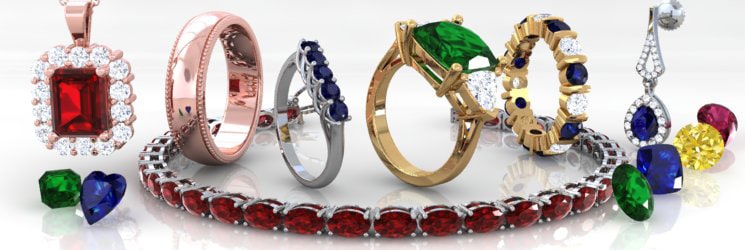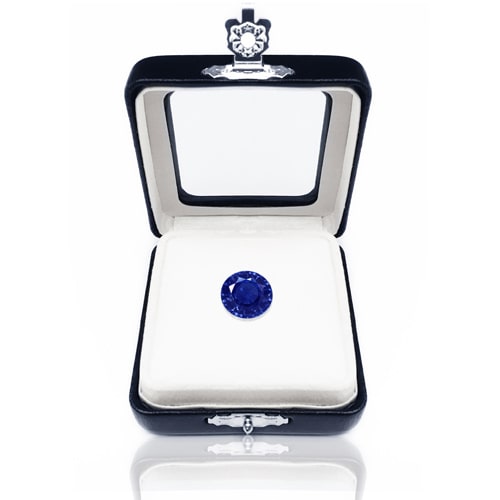Pink Tourmaline Education
- Sapphire Education
- Ruby Education
- Emerald Education
- Alexandrite Education
- Tanzanite Education
- Tsavorite Education
- Aquamarine Education
- Pink Tourmaline Education
- Hessonite Garnet Education
- Peridot Education
- Spinel Education
- Paraiba Tourmaline Education
- Morganite Education
- Diamond Education
- Lab Diamond Education
Pink Tourmaline Overview
One of the most versatile gemstones in the world is the tourmaline. Like sapphires, tourmalines are known for their availability in a wide array of colors. In fact, tourmaline has one of the widest ranges of colors of any gemstone species. Like it's sister stone the Paraiba tourmaline, another extremely popular variety is the pink tourmaline, known to some as rubellite. Compared to the Paraiba tourmaline, pink tourmaline has been in the market for much longer, having been found in mineral deposits in the 1800's and earlier. Pink tourmaline has grown in popularity as the years have gone by, most likely due to three major factors - it's bright, rich color, incredible rarity, and durability for everyday jewelry.
While tourmalines can be found in nearly all colors, the pink tourmaline is the pink to pinkish red variation. Tourmaline is its own mineral, and the presence of various trace elements such as aluminum or iron are what creates its different colored varieties. Pink tourmalines gain their color from the presence of the trace element manganese. In addition to their brilliant and rich color, pink tourmalines are also naturally incredibly brilliant, exhibiting a gleam and shine that certainly catches the eye. Pink gemstones such as sapphires and morganites have made a surge in popularity in the precious gemstone industry, and pink tourmaline has become more and more desirable for those looking for alternatives to other gemstones or wish for a very specific pink hue.
While not as rare as its sister the Paraiba tourmaline, pink tourmalines are still incredibly rare. Pink tourmaline is still the most sought-after variety of tourmaline, which in itself is a very rare mineral, thus making the market for it much more competitive. This rarity has only made the pink tourmaline more sought after; either by those looking to add a rare piece to their collection, investors seeking to make a substantial profit, or simply those wishing to add a beautiful and eye-catching piece to their jewelry.
On the Mohs scale of hardness, pink tourmaline ranks at a 7.5 out of 10, making it one of the hardest gemstones on the market today. This durability and hardness makes the pink tourmaline a very popular choice among those looking to wear it set in jewelry, particularly engagement rings. It is able to withstand the wear and tear of average everyday life while maintaining a brilliant look.
Pink Tourmaline Garnet Quality and Pricing Factors
Unlike most gemstones, there are no individual grading systems for each quality of a pink tourmaline. Rather, there is a singular letter grade for the tourmaline overall. The basis of this letter grade (A-AAA) are still the same qualities that nearly all gemstones are judged upon.
Quality of a tourmaline is predicated on three important factors: color, clarity and transparency.
Color
Color is the most important quality factor for a pink tourmaline and is the primary driver of value. General rule is that as color saturation of a tourmaline increases, the value increases. However, as the tourmaline color becomes oversaturated and eventually opaque, the price drops substantially. A very light color tourmaline and an overly dark/opaque tourmaline will generally command a similar price.
Clarity
Colored gems do not have a standardized grading system and it is extremely rare to find a pink tourmaline with no eye visible imperfections. This is in stark contrast to Diamonds who have a standardized grading system and utilize magnification to inspect clarity. In the wholesale trade we evaluate tourmaline clarity using the following methodology:
(1) Holding the tourmaline face up 12 inches from the observer's eye (2) Tilting them in various directions to visually inspect if any inclusions are visible (3) Only imperfections viewable on the crown (top part of the gemstone) are inspected and not the pavilion (back side)
Cut / Transparency
Lapidary's cut pink tourmalines according to the shade of the tourmaline rough material to get the desired color (the primary price driver). Darker material is cut shallower to allow more light to go through the gem, while lighter material is cut deeper to allow the tourmaline to hold in more light and increase saturation. Cutting pink tourmaline is an art and requires years of experience.
Carat / Measurements
The weight of a gemstone is measured in a unit called carats (cts.). There are 5 carats in 1 gram. As discussed above, a pink tourmaline can be cut deep or shallow to maximize the color of the tourmaline. A deep cut 1 carat tourmaline will appear visually smaller than a 1 carat shallow tourmaline. For this reason, it is best to judge a tourmaline based on millimeter measurements (length and width) and not carat weight.
Click here for our Stone Size Chart which you can print to see the actual sizes of various shapes
Click here for our Stone Size Tool where you can input various measurements to see a basic rendering of centerstone sizes relative to your finger - particularly useful if you are planning to mount the gem in a ring.
Please Note: The carat weight listed on the website for pairs is the combined total weight of the two gemstones.
Origin
Pink tourmalines are mined in various locations around the world. All origins produce high and low quality gemstones. Currently there is no excess premium for one origin over another. However, tourmalines from California and Africa tend to have higher quality deposits.
Care Instructions
Pink tourmalines are easy to take care of due to their hardness and durability. To keep your tourmaline jewelry sparkling you may want to clean it to remove the unwanted dirt and residue build up. Here are a few care tips to keeping your pink tourmaline jewelry clean and shiny.
1) Avoid contact with make-up, harsh chemicals (i.e. chlorine and bleach), moisturizers and abrasives. Best to take jewelry off when in contact with these items. Never swim or bathe with your jewelry on. It is also best to avoid hard impact activities that may scratch or chip the tourmaline such as exercising and gardening. 2) Clean your tourmaline by pouring lukewarm water in a bowl and mixing with mild cleaning detergent. Submerge your jewelry until the dirty and residue is moistened. Then use a soft toothbrush to clean the underside of the tourmaline. Once clean, rinse and dry with a soft cloth. For extremely dirty jewelry, you may need to repeat the process. 3) Store your tourmaline jewelry individually and avoid contact with other jewelry to prevent scratching. Keep the tourmaline away from heat and direct sunlight. For every day rings (such as engagement rings), we recommend a weekly rudimentary check to ensure the center gem is not loose. Take off the ring and shake next to the ear (can also tap) and see if you hear rattling. If you do, immediately stop wearing and get tightened. 4) We highly recommend an annual maintenance on your tourmaline jewelry to have the gems tightened and jewelry professionally cleaned. This will ensure your jewelry lasts a lifetime. 5) Do not use commercial jewelry cleaners or ultrasonic cleaners for your Pink Tourmaline jewelry.












 Custom Gallery
Custom Gallery Custom Process
Custom Process Custom Request Form
Custom Request Form









